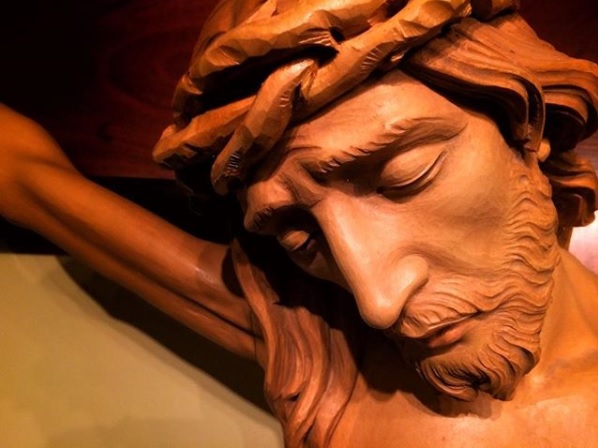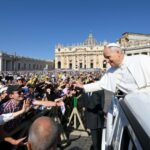MESSAGE FROM HOLY FATHER FRANCIS
FOR LENT 2020
«In the name of Christ, we ask you to be reconciled with God» (2 Cor 5:20)
Dear brothers and sisters:
The Lord grants us once again this year a favorable time to prepare ourselves to celebrate with renewed hearts the great Mystery of Jesus’ death and resurrection, the foundation of personal and communal Christian life. We must continually return to this Mystery, with our mind and heart. In fact, this Mystery continues to grow within us as we allow ourselves to be involved by its spiritual dynamism and embrace it, responding freely and generously.
1. The Paschal Mystery, foundation of conversion
The joy of the Christian springs from listening to and accepting the Good News of Jesus’ death and resurrection: the kerygma. This summarizes the Mystery of a love “so real, so true, so concrete, that it offers us a relationship full of sincere and fruitful dialogue” (Exhort. ap. Christus vivit, 117). Whoever believes in this proclamation rejects the lie that we are the ones who give origin to our lives, when in reality it is born from the love of God the Father, from His will to give life in abundance (cf. Jn 10:10). Conversely, if we prefer to listen to the persuasive voice of the “father of lies” (cf. Jn 8:44), we risk sinking into the abyss of meaninglessness, experiencing hell here on earth, as many dramatic events of personal and collective human experience sadly testify.
Therefore, in this Lent 2020, I would like to address each and every Christian with what I already wrote to young people in the Apostolic Exhortation Christus vivit: “Look at the open arms of Christ crucified, let yourself be saved again and again. And when you approach to confess your sins, believe firmly in His mercy that frees you from guilt. Contemplate His blood shed with such love and let yourself be purified by it. Thus, you can be reborn, again and again” (n. 123). Jesus’ Easter is not an event of the past: by the power of the Holy Spirit, it is always current and allows us to look at and touch with faith the flesh of Christ in so many suffering people.
2. Urgency of conversion
It is healthy to contemplate more deeply the Paschal Mystery, through which we have received God’s mercy. The experience of mercy is indeed only possible in a “face-to-face” encounter with the crucified and risen Lord “who loved me and gave Himself for me” (Gal 2:20). A heart-to-heart dialogue, from friend to friend. That is why prayer is so important during Lent. More than a duty, it shows us the need to respond to God’s love, which always precedes and sustains us. In fact, the Christian prays with the awareness of being loved without deserving it. Prayer can take different forms, but what truly matters in God’s eyes is that it penetrates within us, reaching even the hardness of our hearts, to convert them more and more to the Lord and His will.
Therefore, in this favorable time, let us be guided like Israel in the desert (cf. Hos 2:16), so that we can finally hear the voice of our Bridegroom, to resonate within us with greater depth and readiness. The more we let ourselves be fascinated by His Word, the more we will experience His free mercy towards us. Let us not let this time of grace pass in vain, with the presumption that it is we who decide the time and manner of our conversion to Him.
3. God’s passionate desire to dialogue with His children
The fact that the Lord offers us once again a favorable time for our conversion should never be taken for granted. This new opportunity should evoke in us a sense of gratitude and shake off our sluggishness. Despite the — sometimes dramatic — presence of evil in our lives, as well as in the life of the Church and the world, this space offered to us for a change of course manifests God’s persistent will not to interrupt the dialogue of salvation with us. In Jesus crucified, “God made Him to be sin for our sake” (2 Cor 5:21), this will has reached the point of casting all our sins upon His Son, even “making God against God,” as Pope Benedict XVI said (cf. encyclical Deus caritas est, 12). Indeed, God also loves His enemies (cf. Mt 5:43-48).
The dialogue that God wishes to establish with every man, through the Paschal Mystery of His Son, is not like that attributed to the Athenians, who “were always busy saying or hearing the latest novelty” (Acts 17:21). This kind of superficial chatter, driven by empty curiosity, characterizes the worldliness of all times, and today it can also subtly appear in a deceptive use of the media.
4. A wealth to share, not just to accumulate for oneself
Centering the Paschal Mystery in life means feeling compassion for the wounds of the crucified Christ present in the many innocent victims of wars, abuses against life both of the unborn and the elderly, various forms of violence, environmental disasters, unjust distribution of earth’s goods, human trafficking in all its forms, and the insatiable thirst for profit, which is a form of idolatry.
Today it remains important to remind men and women of good will that they must share their goods with the most needy through almsgiving, as a form of personal participation in building a more just world. Sharing with charity makes a person more human, while accumulating risks hardening him, as he closes himself in his own egoism. We can and must go even further, considering the structural dimensions of the economy. For this reason, during Lent 2020, from March 26 to 28, I convened in Assisi young economists, entrepreneurs, and change-makers, with the aim of helping to design a more just and inclusive economy than the current one. As the Church’s magisterium has often repeated, politics is an eminent form of charity (cf. Pius XI, Discourse to the FUCI, December 18, 1927). Caring for the economy with this same evangelical spirit, which is the spirit of the Beatitudes, will also be a form of charity.
I invoke the intercession of the Blessed Virgin Mary over the upcoming Lent, so that we may hear the call to be reconciled with God, fix our hearts on the Paschal Mystery, and convert to an open and sincere dialogue with the Lord. In this way, we can become what Christ says of His disciples: the salt of the earth and the light of the world (cf. Mt 5:13-14).
Rome, near St. John Lateran, October 7, 2019
Memorial of Our Lady, the Virgin of the Rosary
Francis










